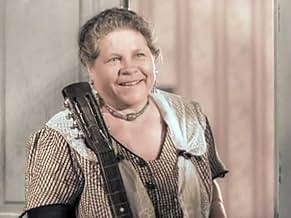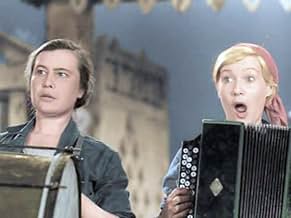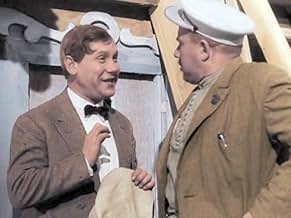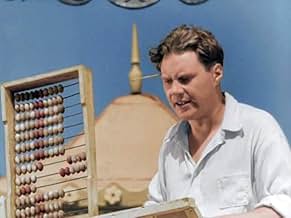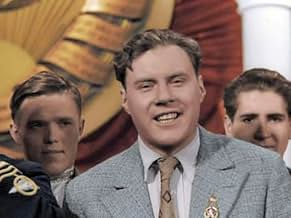NOTE IMDb
6,6/10
832
MA NOTE
Ajouter une intrigue dans votre langueWidely claimed to be Joseph Stalin's favorite movie, this classic musical comedy is a must-see. The action takes place on a steamboat on the iconic Volga River, as two groups of performers t... Tout lireWidely claimed to be Joseph Stalin's favorite movie, this classic musical comedy is a must-see. The action takes place on a steamboat on the iconic Volga River, as two groups of performers travel to Moscow to perform in the Moscow Musical Olympiad.Widely claimed to be Joseph Stalin's favorite movie, this classic musical comedy is a must-see. The action takes place on a steamboat on the iconic Volga River, as two groups of performers travel to Moscow to perform in the Moscow Musical Olympiad.
- Réalisation
- Scénario
- Casting principal
- Récompenses
- 1 victoire au total
Anatoli Shalayev
- The Boy Musical Prodigy
- (as Tolya Shalayev)
Mariya Mironova
- The Secretary
- (as M. V. Mironova)
Nikita Kondratyev
- The Waiter
- (as N. S. Kondratyev)
Vsevolod Sanaev
- The Lumberjack
- (as V. V. Sanayev)
Alexei Dolinin
- The Militia Man
- (as A. G. Dolinin)
Ivan Chuvelyov
- The Olympiad Representative
- (as I. P. Chuvelyov)
Nikolai Khryashchikov
- Appearing
- (non crédité)
Yakov Rykov
- Tugboat captain
- (non crédité)
Lidiya Vinogradova
- Amateur Performer
- (non crédité)
Avis à la une
As most of its (all too few) viewers know, »Volga Volga« was supposed to be the Soviet counterpart to Hollywood musical comedies of the time. It is also well-known it was Stalin's favourite movie... So what? Wagner was Hitler's favourite composer does that make him a bad composer? Hitler also loved Greta Garbo, Charlie Chaplin, Marlene Dietrich... does that make them trash?
However, I *do* find it fascinating that Stalin loved this film. I find it even more fascinating that the film was released for the general public to see, and that its director wasn't sent to Siberia.
Yes, it has propaganda written all over it in the same fashion as the contemporary »Yankee Doodle Dandy« has, to mention just one famous non-Soviet example. But what makes this film such a wonderful comedy is the intelligent at times spine-chilling humour of the dialogues. However, only viewers who are familiar with the Soviet political (and general) culture of the time will appreciate them or even notice them. If one doesn't know that the young man is reciting a very famous poem by Lermontov when trying to impress the semi-illiterate political chieftain, it will be very difficult to appreciate the latter's bewildered expression and his reply: »Oh, begone with your self-critique, save it for the next political meeting« (I am quoting from memory, based on the original, not on the English translation, which I am not familiar with). Indeed, one has to know what »self-critique« meant... If you do, you'll find it a cracking-funny dialogue. The same goes for many, many other scenes like the one when the ship's cook introduces (and re-introduces) himself to the ignorant political chief, starting merrily as a »chef« and ending up as a »food-processing worker«. And then some scenes are sheer poetry: like the one when the entire village is chanting the contents of a telegram from the river bank, so that the eager recipient of the telegram already embarked on a ship - will hear it..:)
The ideology behind it is clear: only the peasants sorry, »land workers« - are healthy and wise. The only jerk in the film is the hilariously ignorant and self-important representative of the political »authorities«. This, I suppose (besides the wonderful humour and the cheerful music), is what made this film so popular with the »masses«. And this must be also the reason why the film was released. (In 1938, no less when political »purging« was at its worst.)
There are however, certain scenes in the film that make me wonder how on earth it made it past the censors. (Due to Stalin's personal intervention, no doubt?) The oddest example comes towards the end of the film, when the political chieftain is asked by the port authorities whether he is the author of the (title) song »Volga Volga«. Panicking, he not only blames someone else (»Shulbert«, Franz Schubert to you and me) regardless of the fact that »Shulbert« most definitely did NOT »do« it - but he starts screaming: »I confess nothing, I confess nothing!«, even though nobody had asked him to confess anything... Only those who know what »confession« implied can find his mindless reaction hilarious and spine-chilling.
It is said that Stalin had a copy of this film delivered to the USA authorities. They were so baffled by it that they searched it for hidden messages. If this is true, it just goes to show how little they understood and knew about each other.
Or is there a hidden message...? :)
However, I *do* find it fascinating that Stalin loved this film. I find it even more fascinating that the film was released for the general public to see, and that its director wasn't sent to Siberia.
Yes, it has propaganda written all over it in the same fashion as the contemporary »Yankee Doodle Dandy« has, to mention just one famous non-Soviet example. But what makes this film such a wonderful comedy is the intelligent at times spine-chilling humour of the dialogues. However, only viewers who are familiar with the Soviet political (and general) culture of the time will appreciate them or even notice them. If one doesn't know that the young man is reciting a very famous poem by Lermontov when trying to impress the semi-illiterate political chieftain, it will be very difficult to appreciate the latter's bewildered expression and his reply: »Oh, begone with your self-critique, save it for the next political meeting« (I am quoting from memory, based on the original, not on the English translation, which I am not familiar with). Indeed, one has to know what »self-critique« meant... If you do, you'll find it a cracking-funny dialogue. The same goes for many, many other scenes like the one when the ship's cook introduces (and re-introduces) himself to the ignorant political chief, starting merrily as a »chef« and ending up as a »food-processing worker«. And then some scenes are sheer poetry: like the one when the entire village is chanting the contents of a telegram from the river bank, so that the eager recipient of the telegram already embarked on a ship - will hear it..:)
The ideology behind it is clear: only the peasants sorry, »land workers« - are healthy and wise. The only jerk in the film is the hilariously ignorant and self-important representative of the political »authorities«. This, I suppose (besides the wonderful humour and the cheerful music), is what made this film so popular with the »masses«. And this must be also the reason why the film was released. (In 1938, no less when political »purging« was at its worst.)
There are however, certain scenes in the film that make me wonder how on earth it made it past the censors. (Due to Stalin's personal intervention, no doubt?) The oddest example comes towards the end of the film, when the political chieftain is asked by the port authorities whether he is the author of the (title) song »Volga Volga«. Panicking, he not only blames someone else (»Shulbert«, Franz Schubert to you and me) regardless of the fact that »Shulbert« most definitely did NOT »do« it - but he starts screaming: »I confess nothing, I confess nothing!«, even though nobody had asked him to confess anything... Only those who know what »confession« implied can find his mindless reaction hilarious and spine-chilling.
It is said that Stalin had a copy of this film delivered to the USA authorities. They were so baffled by it that they searched it for hidden messages. If this is true, it just goes to show how little they understood and knew about each other.
Or is there a hidden message...? :)
A musical comedy. The famous work of the famous director Grigory Alexandrov and the actress Lyubov Orlova, beloved by millions at that time, as well as Comrade Stalin's favorite film, which he often reviewed. And how could you pass by such a thing? So the author of this review could not do this, and looked at the picture with great pleasure. And the final result rather pleased him. And here is a brief opinion - A good Soviet musical comedy of the late thirties. There were almost only advantages in it (with the exception of editing, but the author of this review will tell you about this in a separate paragraph), but for now you should finish the introduction and move on to the interesting.
So, here are the pros: 1. The scenario - the picture tells the story of two amateur musical groups that go to Moscow to participate in the Olympics, and the leaders of these groups: Avdotya Petrova, nicknamed "Strelka" and Alexey Trubyshkin are lovers, which gives everything that is happening a whisper of piquancy. At the same time, the local bureaucrat Byvalov takes part in all this activity, who wants to "push himself" at the expense of talented people. The old pilot fits well into this company. There are many different situations waiting for them on the way, and in the final there will be a grand triumph. In addition, the creators even destroy the "fourth wall", which looks pretty good. In addition to the fact that the script here is easy, it also charges every viewer who looks at the picture with a great mood. It's worth a lot.
2. Humor - there are frankly funny moments, and a lot of funny situations, and outright antics of some actors (in most cases it works correctly). Of course, wild laughter is not worth hoping for, although there is one point that strongly leads to this. The humor here is more mundane, and that's what catches on.
3. Songs and music - this picture can now be called a musical with full rights, since they sing and dance quite often here - and it turned out just great. The precision of the movements, and this despite the fact that some of the artists were already far from young. And the songs are pleasing to the eye and ear. Although there is not a single one that sticks in the memory (except classical music, which everyone knows). Although their text was written by Vasily Lebedev-Kumach.
4. The life of the USSR in the thirties - we will be shown the Volga-Don Canal, which was one of the great buildings of communism, musical competitions, and not only. They will show us how life itself is changing, how the achievements of the Soviet government made the dreams of ordinary people a reality. And although the scenario line with Byvalov is reduced to humor, it reflects reality (which is still relevant).
Now it should be said about an important point that somewhat spoils the overall impression, namely the crooked installation, and the author of this review watched the color version of the painting, which was castrated in the fifties of the last century, and the original of 1938 has not been preserved (thank you tell the Cornhusker for this), so we cannot enjoy the original version. And it's lucky that they didn't paint the fully castrated version, because there is a black-and-white version from 1961, from where all mentions of Stalin, his images and busts were cut out. The installation was done very poorly and the glues are visible (this is written by a person who has been engaged in installation for a long time).
Separately, the author of this review wants to thank the artists Igor Ilyisky (bureaucrat Byvalov), Lyubov Orlova, Andrei Tutyshkin, Vladimir Volodin (old pilot), and all the others for the talented performance of their roles in this musical comedy. Now their acting will seem too "pompous" to many, but they tried anyway, and it's not for nothing that the picture has gained well-deserved popularity, and it's not for nothing that it has gained cult status in the country. You need to know the classics!
A score of 8 out of 10 and a recommendation to watch!
So, here are the pros: 1. The scenario - the picture tells the story of two amateur musical groups that go to Moscow to participate in the Olympics, and the leaders of these groups: Avdotya Petrova, nicknamed "Strelka" and Alexey Trubyshkin are lovers, which gives everything that is happening a whisper of piquancy. At the same time, the local bureaucrat Byvalov takes part in all this activity, who wants to "push himself" at the expense of talented people. The old pilot fits well into this company. There are many different situations waiting for them on the way, and in the final there will be a grand triumph. In addition, the creators even destroy the "fourth wall", which looks pretty good. In addition to the fact that the script here is easy, it also charges every viewer who looks at the picture with a great mood. It's worth a lot.
2. Humor - there are frankly funny moments, and a lot of funny situations, and outright antics of some actors (in most cases it works correctly). Of course, wild laughter is not worth hoping for, although there is one point that strongly leads to this. The humor here is more mundane, and that's what catches on.
3. Songs and music - this picture can now be called a musical with full rights, since they sing and dance quite often here - and it turned out just great. The precision of the movements, and this despite the fact that some of the artists were already far from young. And the songs are pleasing to the eye and ear. Although there is not a single one that sticks in the memory (except classical music, which everyone knows). Although their text was written by Vasily Lebedev-Kumach.
4. The life of the USSR in the thirties - we will be shown the Volga-Don Canal, which was one of the great buildings of communism, musical competitions, and not only. They will show us how life itself is changing, how the achievements of the Soviet government made the dreams of ordinary people a reality. And although the scenario line with Byvalov is reduced to humor, it reflects reality (which is still relevant).
Now it should be said about an important point that somewhat spoils the overall impression, namely the crooked installation, and the author of this review watched the color version of the painting, which was castrated in the fifties of the last century, and the original of 1938 has not been preserved (thank you tell the Cornhusker for this), so we cannot enjoy the original version. And it's lucky that they didn't paint the fully castrated version, because there is a black-and-white version from 1961, from where all mentions of Stalin, his images and busts were cut out. The installation was done very poorly and the glues are visible (this is written by a person who has been engaged in installation for a long time).
Separately, the author of this review wants to thank the artists Igor Ilyisky (bureaucrat Byvalov), Lyubov Orlova, Andrei Tutyshkin, Vladimir Volodin (old pilot), and all the others for the talented performance of their roles in this musical comedy. Now their acting will seem too "pompous" to many, but they tried anyway, and it's not for nothing that the picture has gained well-deserved popularity, and it's not for nothing that it has gained cult status in the country. You need to know the classics!
A score of 8 out of 10 and a recommendation to watch!
When Stalin ordered Alexandrov to make this movie, he said he only wanted to see the happy images of the simple rural people along the river Volga. One could say, Stalin wanted something that would prove to him his people are happy (even if he ordered others to lie to him to make the appearance of happiness). There's no real story or plot, there's just a number of folk dances and rituals thrown together in order to entertain. It's kitch that served only one purpose - to make a dictator happy. I wouldn't even classify this movie as a comedy, it's simply a musical, or better yet a recorded account of folk dancing and singing with some attempts to moderate the time in between the musical sequences. Thus you should not even look for the depth of the characters or the story. Were it made that way Alexandrov might have even been shot! This film could not afford to be critical. IT was made in an era of Soviet history when one could not express one's self as an artist, but had to do what the propaganda machine demanded of him.
Allegedly, this was Joseph Stalin's favourite film, and it may be interesting to see for oneself what amused one of the sickest minds in history. Apart from that historical aspect, this film has no basis in reality, moreover, it never did. While millions of Russian citizens were being sent to concentration camps for no reason except suspicion of treason (whatever that meant), this film depicts life in the Imaginary Soviet Union, where people live happy and carefree lives. A good example of how Soviet propaganda worked itself out in the Russian cinema. Aesthetically, there are many good Russian -- even Soviet -- films. However,this one isn't one of them.
This 1938 musical comedy from the Soviet Union directed by Grigori Alexandrov has some fame as Stalin's favorite movie. He liked it so much he has it shown in his private screening room at the Kremlin to his Politburo colleagues scores of time. He repeatedly teased Khrushchev for his likeness to Byvalov, the humorless village bureaucrat played by Igor Ilinsky.
The movie opens with an amusing intro in which a catchy song mentions the main cast and the characters they play. Then it moves to a scene showing the two love interests of the film kissing in the mouth (the kiss is far more passionate than what most movies from the West would permit at the time). And then we go to the main story. In a country village along the Volga River, there is a friendly competition between a folk music band (led by the beautiful Lyubov Orlova) and a more conventional classical music outfit, which is led by her boyfriend, Alyosha (played by Andrei Tutyshkin). When in the village they heard there is a musical contest for country bands in Moscow, and despite the initial opposition of the bureaucrat, both bands take the river boat to reach the capital.
Naturally for a musical comedy, the finest thing in the film is the musical numbers. The best in my opinion comes around the middle when virtually all the village gets into playing different tunes to convince the bureaucrat that they have talent worthy of going to the contest in Moscow. The movie oozes nostalgia for the simple village life (in a time when the Soviet Union was rapidly urbanizing) and is also how the Soviet government has made life so much better than now villagers mostly has to worry not about surviving but about playing in music contests. Only towards the end the movie falls into the territory of heavy propaganda. The sympathy of Orlova helps (though sometimes she stretches it too far).
The movie opens with an amusing intro in which a catchy song mentions the main cast and the characters they play. Then it moves to a scene showing the two love interests of the film kissing in the mouth (the kiss is far more passionate than what most movies from the West would permit at the time). And then we go to the main story. In a country village along the Volga River, there is a friendly competition between a folk music band (led by the beautiful Lyubov Orlova) and a more conventional classical music outfit, which is led by her boyfriend, Alyosha (played by Andrei Tutyshkin). When in the village they heard there is a musical contest for country bands in Moscow, and despite the initial opposition of the bureaucrat, both bands take the river boat to reach the capital.
Naturally for a musical comedy, the finest thing in the film is the musical numbers. The best in my opinion comes around the middle when virtually all the village gets into playing different tunes to convince the bureaucrat that they have talent worthy of going to the contest in Moscow. The movie oozes nostalgia for the simple village life (in a time when the Soviet Union was rapidly urbanizing) and is also how the Soviet government has made life so much better than now villagers mostly has to worry not about surviving but about playing in music contests. Only towards the end the movie falls into the territory of heavy propaganda. The sympathy of Orlova helps (though sometimes she stretches it too far).
Le saviez-vous
- AnecdotesFamously, this was Joseph Stalin's favorite film and he would often show off how well he knew it by performing every part just before the actors on screen.
- ConnexionsFeatured in Komediya davno minuvshikh dney (1980)
Meilleurs choix
Connectez-vous pour évaluer et suivre la liste de favoris afin de recevoir des recommandations personnalisées
Détails
- Durée
- 1h 44min(104 min)
- Couleur
- Mixage
- Rapport de forme
- 1.37 : 1
Contribuer à cette page
Suggérer une modification ou ajouter du contenu manquant


